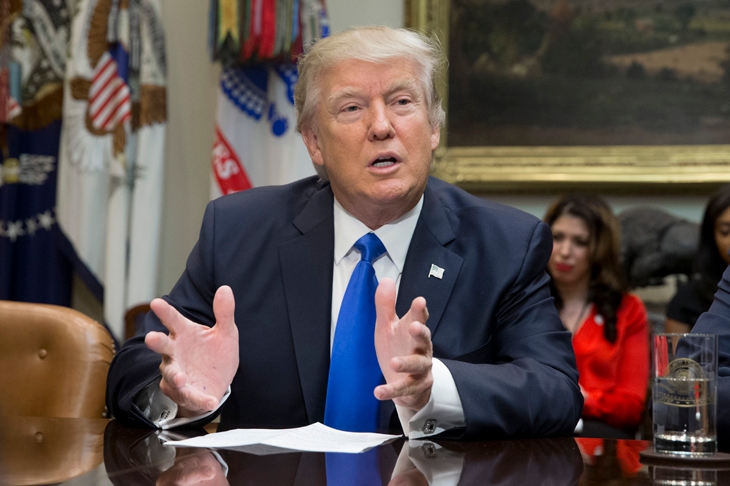President Donald Trump is demolishing his predecessor’s legacy as fast as he can sign executive orders, but one thing for which the Obama administration will be remembered is its zest for imposing fines on UK and European banks. In a flurry of Department of Justice activity ahead of the transfer of power, Deutsche Bank agreed to pay $7.2 billion and Credit Suisse $5.3 billion for misleading investors in mortgage-backed securities before 2008, while Deutsche also copped a $630 million penalty (from UK as well as US regulators) for alleged money-laundering on behalf of Russian clients.
Meanwhile, Royal Bank of Scotland set aside another $3.8 billion, making a total provision of $8.3 billion towards an eventual settlement for mis-selling which many observers expect to exceed that figure by a distance and eat a big chunk of the crippled lender’s shrunken net worth. And Barclays, having refused to settle on the DoJ’s terms, awaits its day in court.
This was never entirely about scape-goating foreigners. There have been giant penalties on US banks too: $17 billion for Bank of America, $5 billion for Goldman Sachs. But this column reported in 2014 a conspiracy theory that ‘the hounding of non-US banks by the DoJ… has a more sinister foreign-policy impetus behind it’: namely, an attempt at that time to bring Europe into line on sanctions against Russia.
The case in point was a $9 billion fine on BNP which — so Vladimir Putin claimed — might have been negotiable if France had agreed to cancel a contract to build two assault ships for the Russian navy. More recently, French presidential candidate François Fillon has urged Angela Merkel to join him in confronting Trump over the ‘unilateralism’ of US fines on European banks.
Where’s this story going next? If Russia is really a factor, Trump will probably make a show of not caring whether Europe is onside when he does his own deal with Putin. On the domestic front, the Trump White House is staffed by ex-Goldman people, his cabinet is packed with billionaire ‘friends of Wall Street’, deregulation is the executive order of the day, and Breitbart — alma mater of Trump sidekick Steve Bannon — reports that Obama used ‘more than $650 million’ of bank fine proceeds to fund ‘progressive liberal [and] left-wing organisations’. So an end to vengeance against US banks may be a natural move for the new regime.
On the other hand, foreign banks that stand accused of cheating America’s citizens or aiding its enemies remain ideal targets for Trumpist jingoism. So I wouldn’t bet on RBS getting off more lightly because Obama has gone. I liked the punchline offered on this topic by Jon Shazar on Dealbreaker — ‘If the Mexicans won’t pay for the Wall, maybe the Scots will’ — but I fear that punishment may fall, bizarrely, on the English taxpayer.
Tesco’s Booker prize
It’s hard to remember the last time there was a good-news story about Tesco, whose shares stand at half of what they were worth four years ago. Some prominent hedge funds evidently expected them to fall further — and were caught short of the stock when the price jumped 20 pence last Friday on the announcement of a £3.7 billion takeover of the Booker food group.
If competition authorities don’t block it, this looks a smart deal. It gives Tesco an extra slice of the UK grocery market without actually adding more Tesco stores, and takes the group into new areas such as restaurant supply; it puts Tesco buying power and logistical strength behind the Booker network; and it promises economies of scale. Like last year’s Sainsbury-Argos merger, it demonstrates smart lateral thinking in the overpopulated supermarket sector.
Of course many Spectator readers will worry that more power to the Tesco monster means worse prospects for independent grocers, butchers and fishmongers — but those who have survived the retail revolution thus far are likely to go on surviving, supported by middle-class foodies, while Booker’s 5,000-plus franchised Londis, Budgens and Premier convenience stores (each one a small business in its own right) will have more to offer in the less prosperous towns and suburbs that they serve.
But — I hear you ask — does this also mean the Booker Prize is about to mutate into the Tesco Prize? The award had its origin in Booker’s diversification away from its core sugar-refining business in British Guiana in the 1960s. A portfolio of authors’ rights was acquired, including those of Ian Fleming, and their profits funded the competition for novelists — until sponsorship transferred in 2002 to Man Group, a hedge fund firm that also has a history in sugar. Hence the prize is now the Man Booker, and Tesco-phobic literati need not fret.
A man who always decided
Sir Christopher Bland, the former chairman of BT, London Weekend Television and the BBC, who died last week, was a man who took himself seriously — as I discovered when I listened to him complaining about the hours of queuing he had endured to get into the notorious Millennium Eve party at the Dome. The vision of all those VIPs shivering through Stratford station seemed comic to me, but not to him. ‘What are you laughing at?’ he barked, bringing our social encounter to an abrupt end.
But still I admired him both for the extraordinary range of his interests — which included wine-making and novel-writing, as well as a dozen chairmanships — and for the cut-the-crap clarity that made him a boardroom role model for many younger executives. One friend of mine who worked for Bland at the privatised haulage group National Freight before going on to higher things recalls: ‘Christopher taught me always to make a decision: however difficult, never dither. Of course you might get it wrong sometimes. But if you’re any good at your job, you’ll far more often be right.’ Remarkable how many people rise to the top without learning to apply that simple rule.







Comments